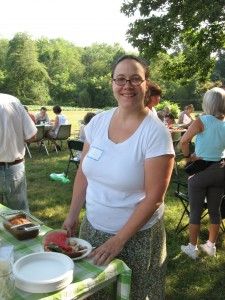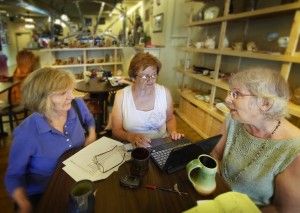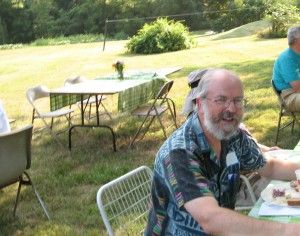In 1959, urban observer, writer, and activist Jane Jacobs visited Boston’s North End. There, she was amazed that a community many dismissed as too far gone had revitalized without any outside financing or urban planning. How had the North End built itself into a safe, well-groomed, healthy neighborhood? Through neighbors voluntarily exchanging skilled work.But that was in the 1950s. Can the same types of exchanges — where time, not cash, is the currency — still build communities that ought to be?
Members of Pennsylvania’s Phoenixville Area Time Bank say yes, the free exchange of time can create cohesive, trusting, and beautiful neighborhoods, and they have seen it happen.
Time banks build on the age-old concept of swapping, and provide a web-based infrastructure that lets people bank hours instead of money. Members contribute services like plumbing, tutoring, computer repair, respite care, driving, shopping, and childcare. Logging service hours into a database means they’ve earned hours to “spend” by having any of the 170 Phoenixville Area Time Bank members provide a service for them.
And an hour means an hour, no matter what hourly rate the work could fetch elsewhere. “Yes,” says board member Joel Bartlett, “my hour of architectural services is worth a disabled person’s hour of weeding!” Also, the person served reimburses all expenses so that it is purely a time-for-time exchange.

New members receive a list of over 70 suggested services they might contribute or need. “Exchanges can be as creative as anyone’s imagination,” says Judy Antipin, a Phoenixville Area Time Bank member since 2007. Judy’s partner Diane recently returned from the hospital and about six PATB members gave her meals and rides and cleaned her house. Member Richard Liston is banking time dollars to earn help with the fledgling Sphere College, a free college he founded for nontraditional students. One member banked enough hours to have time dollars pay for a whole wedding.
But more is happening than the exchange of services, members insist. “The transactional piece is a piece,” says member Carol Meerschaert, who recently discovered PATB on Meetup.com. She pictures a time bank as a small village or an extended family. Transactions forge trust and inspire responsiveness. It takes trust to have a stranger pick you up from the airport, but members are accountable to each other. There is a “kind of reverence we bring to each other,” says coordinator Margo Ketchum. As people bank their time and meet each other, they begin to care about each other.
This is essential in Phoenixville, a gentrifying borough of 16,000 about 30 miles from Philadelphia, that, like many of Pennsylvania’s former iron towns, went from whirring with industry to decaying economically in the last century. Like a lucky few, Phoenixville has begun rehabilitating with arts and business. It features beacons of hipness such as creperies, cafés, bistros, and independent bookstores. Thrilling as these beacons are, changes of this sort have often, across America, turned ugly, territorial, and marginalizing when neighbors do not have each other’s best interests in mind.
PATB was not formed to help Phoenixville navigate its neighborhood renewal, but it does want to support a truly resilient community. Time banks facilitate this because, as Bartlett puts it, “Exchanges are not exchanges. They’re connections.” If members connect with neighbors, they begin to realize what matters to their neighbors. Meerschaert explains that this means that people care about crime, taxes, school budgets — the things that affect these neighbors whom they now know much better.
What’s remarkable about these connections is that they intentionally enfold

vulnerable residents, who often get sidelined or used as leverage during gentrification. Forty non-profits exist in Phoenixville and provide a spectrum of care for area residents. When Ketchum, her husband Joel Bartlett, and a number of others heard Time Banks USA founder Edgar S. Cahn speak at one of these non-profits, an idea was born for a time bank with a unique niche.
They observed that those who benefited from social service agencies were not encouraged to give back to Phoenixville. Passive receiving was the usual model. Those who worked for social service agencies, on the other hand, saw themselves as givers only and had a hard time accepting help. Many time banks dedicate themselves to a cause, and this would be PATB’s. For people in the helping professions, says Meerschaert, who is also the marketing and communications director for Healthcare Businesswomen’s Association, this was “a way to say ‘I need help’ in a safe environment.” In 2010, PATB has begun a “2010 Project” to focus even more on serving the disenfranchised, and twenty-five percent of their members are currently convalescent, unemployed, or otherwise vulnerable.
Time Banks level the playing field. As the PATB vision statement says, they connect unmet needs with personal talents.

Krishna Evans is a vivid example of this. She had devoted so much energy and money to raising her children that she put off small repairs on her family’s home. After joining the time bank two months ago, Evans engaged Bartlett to paint her fence and another member to fix “little annoying things around the house.” Evans had unmet practical needs. She also has talents that are invaluable to others. She has a social work background, delights in spending time with seniors, and loves to garden. So she earns hours by being a resource for the elderly, sharing a knack for gardening, and looking out for seniors’ needs. Banking these hours leads to more possibilities. She hopes to take piano lessons from another member. “I never had the luxury to pay someone to teach me piano,” she says, bright-eyed. “I’m expanding who I am.”
Time banks are expanding people’s options and Phoenixville’s possibilities. But what about neighborhoods that do not yet have a time bank of their own? PATB is currently following two small new time banks in the area and offering the umbrella of their infrastructure. There are about 50 time banks nationwide and many in the United Kingdom, but for those who are not near one of these, the closest time bank may provide ways to link up with a few people nearby and establish an informal program.
From the Phoenixville group that urges those typically seen as “needy” to contribute, to the Brooklyn HMO that uses time dollars to cut seniors’ hospital bills, to the Oakland, California church that, according to Bartlett, used time dollars to set up a community watch system, time banks solve baffling problems. Where neighborhood swaps may have happened spontaneously in the past, our culture of structured social networking calls for more coordinated forms of swapping. And this structure is meeting not just material needs, but also fundamental, intangible ones.

